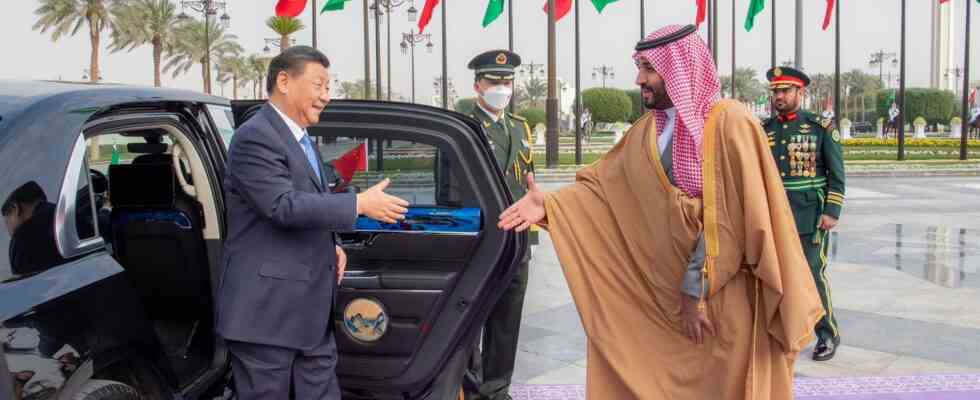analysis
As of: 12/08/2022 10:24 p.m
Chinese Prime Minister Xi’s state visit to Saudi Arabia is not just about oil. Above all, it is about sending a signal to the USA that new geopolitical partners have been found.
It is considered to be China’s largest diplomatic offensive in the Middle East to date: Chinese President Xi Jinping’s three-day trip to Saudi Arabia. The Chinese Foreign Ministry described the visit as an “epochal milestone in the history of the development of Sino-Arab relations”.
Even the reception of the Chinese head of state in Riyadh was correspondingly pompous: He was greeted at the airport by the Saudi foreign minister on a large purple carpet, and Saudi fighter pilots painted the Chinese colors red and yellow in the sky.
Xi met for talks with the Saudi King Salman and the Saudi Crown Prince Mohammed bin Salman – and it quickly became concrete: cooperation agreements were signed, and Saudi and Chinese companies agreed on 34 investment agreements on the sidelines of the visit – in the areas of renewable energies and IT , transportation, construction and logistics. In total, contracts worth around 30 billion US dollars are expected.
One of China’s most important oil suppliers
Above all, China and Saudi Arabia have one thing in common: great economic interests. “The trip is part of a charm offensive by Xi Jinping,” said political scientist John Calabrese of the American University in Washington DC The Gulf region is very important for China’s energy security. “The top priority of the trip is clearly oil.” The People’s Republic is the largest energy consumer in the world and an important trading partner for Riyadh – Saudi Arabia exported oil worth around 50 billion US dollars to China last year, making Riyadh one of the most important oil suppliers for Beijing.
Xi’s three-day visit to Saudi Arabia also includes two summits – one with representatives from other Gulf countries and with other Arab leaders. Egyptian President Abdel Fattah Al-Sisi also traveled to the Gulf.
On the same wavelength
But in addition to economic interests, according to observers, the visit is also a clear geopolitical message from the Saudis and the Chinese to the United States – the signal that there are alternative partners in the world. This Saudi-Chinese rapprochement has been observed for several years, says Angela Stanzel from the German Science and Politics Foundation. And China is thus sending the signal to the United States that, with its alliance with Saudi Arabia, it is entering the “US sphere of influence,” so to speak.
At least when it comes to human rights, China and Saudi Arabia are two brothers in spirit. And so the rulers in the Gulf don’t have to fear one thing during the Chinese visit: the Western heads of state and government pointing fingers at the human rights violations, which the Saudis are beginning to find annoying.
The relationship with the United States in particular has been considered cold in recent years, especially due to the murder of the Saudi journalist Jamal Khashoggi in Istanbul in 2018 – the Saudi royal family itself is considered to be the mastermind. In order to relax the relationship, Joe Biden traveled to the Gulf in the summer. The reception for the US President was not nearly as pompous as the one now for the Chinese head of state.
The long-awaited red carpet treatment
Saudi Arabia is frustrated by Washington’s gradual withdrawal from the Middle East, which it sees as threatening security guarantees. And the Americans are frustrated that Saudi Arabia, the most important country in OPEC, spoke out in favor of cutting production shortly before the US mid-term elections – and that US President Biden was therefore undermined domestically during the election campaign due to the high gasoline and energy prices pressure.
A strained relationship in both directions. An unencumbered partner from Asia on the Gulf is just what you need. Also for the Chinese, Politico correspondent Phelim Kine said in an interview with CBS a few weeks ago: “Xi Jinping’s decision for Saudi Arabia fulfills two key goals of the Chinese: On the one hand, to strengthen the alliance with the most important energy supplier, which is decisive for the Chinese economic engine,” says Kine. On the other hand, Xi chose Saudi Arabia because he is welcome there. “He’s getting the red carpet treatment that Biden didn’t want.”
Relations with Iran and Russia
The only drop of bitterness for the Saudis in relations with the People’s Republic: China does business with all sides. Beijing also maintains a close alliance with Saudi archenemy Iran, and Tehran also supplies the energy-hungry People’s Republic with oil.
The close Chinese relations with Russia, on the other hand, do not stand in the way of the Chinese-Saudi friendship: Despite their partnership with the USA, the Saudis also maintain close economic relations with Moscow and bought large quantities of cheap oil from Russia for their own use in the summer in order to use their own oil Selling oil profitably on the world market.
A maximization of their own economic returns – especially on this point, China and Saudi Arabia should understand each other very well at their meeting. And the Gulf states are sending a signal to the world: their strategic partners are no longer just in the west, but also in Asia.

